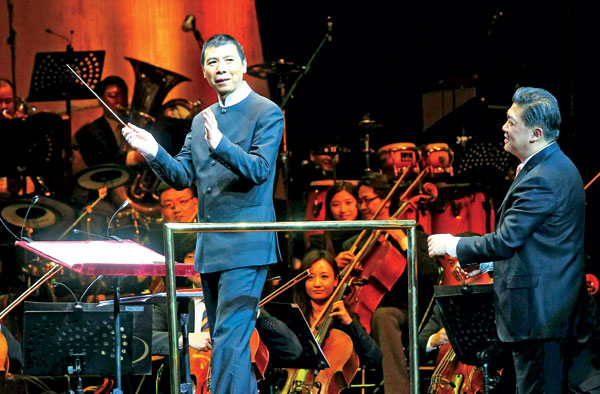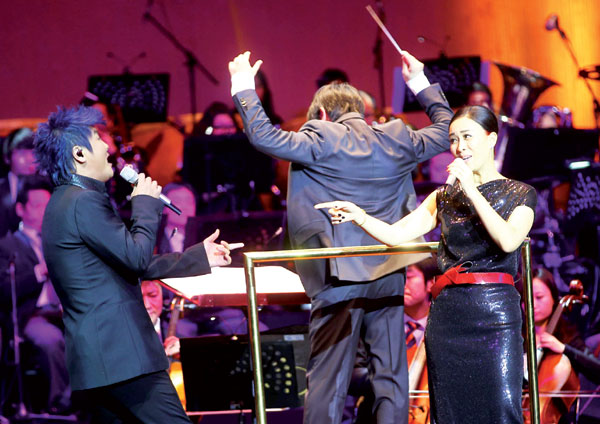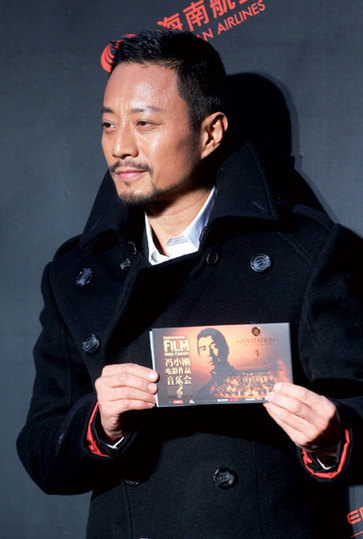Reel music
Updated: 2012-01-17 09:48
By Chen Nan (China Daily)
|
|||||||||||
|
 |
|
Feng Xiaogang realizes his dream of being a conductor, after Yu Long (right) hands the baton over to him. Photos by Zou Hong / China Daily |
|
 |
|
Sun Nan (left) and Na Ying perform a song from Feng Xiaogang's film Sorry Baby. |
Composers who contribute to movie soundtracks are gaining prominence in the domestic film industry. Chen Nan reports.
Feng Xiaogang's Film Music Concert, staged on Jan 3 at Beijing's Worker's Stadium, was the first time a Chinese film director has hosted a concert of music from his movies. The show presented 11 songs from flicks Feng has directed over the past 15 years. The China Philharmonic Orchestra provided instrumentation under Yu Long's baton. And singing came from an all-star lineup of vocalists, including Na Ying, Sun Nan, Yu Quan, Han Lei, Yang Kun and Zhang Liangying.
Also present were many of the actors who've starred in Feng's films, including Ge You, Zhang Hanyu, Liu Pei and Zhang Jingchu.
Feng is acclaimed for his work in the genre called hesuipian, or New Year's celebration films, that were popular in the late 1990s. He is celebrated as one of the most successful Chinese filmmakers, whose films consistently do well at the box office.
"I'm very touched," Feng said onstage at the performance.
"I have made 12 movies over the past 15 years. I was 38 when I made the first, and now I'm 54. The songs remind me of every movie I made, the shooting process and the people I worked with."
Scriptwriter Liu Zhenyun, who wrote the screenplay for Feng's Cell Phone in 2003, says: "It's unconventional for a Chinese film director to review his career through the music of his movies. It also shows Feng has positioned his career at the tricky intersection of film and music."
Performances included the namesake song for the film A World Without Thieves, sung by Yang Kun; Sorry Baby, performed by Na Ying and Sun Nan; and the French song Quand je me Regarde from the movie If You Are The One, sung by Shang Wenjie.
Taiwan composer Guo Zi, who directed the concert, says the goal was to invoke nostalgia.
"We wanted to get the music to conjure memories," Guo says.
"Audiences usually pay attention to films' plots and ignore the existence - let alone the power - of the film's music. We hope audiences will have a different understanding of these movies by presenting them through their music."
The concert concluded with the theme song of Feng's first hesuipian, 1997's Dreamy Factory.
Feng's concert could jumpstart Chinese film music's revival, mainland composer Luan Shu believes.
Luan wrote the song Best Not to Meet for Feng's flick If You Are The One 2. Feng used Tsangyang Gyatso's poem Shi Jie Shi, or Ten Prohibitions Poem, for the lyrics and invited Luan to write the music.
The lyrics read: "Best not to meet you. Then I won't fall in love. Best not to know you. Then I won't miss you. Best not to love you. Then I won't leave you."
They moved Luan.
"It's a beautiful poem that ponders the meaning of love, which echoes the film's theme," Luan says.
Luan invited rock singer Li Mo to perform the vocals.
"I wrote it in a slow and soothing, yet emotional way," Luan says.
"Li's gravelly voice went well with the song. Feng knew exactly what he wanted and trusted me, even though the song is simple and the singer wasn't famous."
While Feng is the first to host such a concert in the country, he is one of many filmmakers who work directly with musicians or seek out unknown musicians, rather than paying music companies for rights to their songs.
"These directors know their tastes and what music can do for their movies," Luan says.
"The musician's fame doesn't matter. What's important is the harmony between the music and film."
Original film music by Chinese musicians has been a staple of the country's film industry since its heyday in the 1980s, when Chinese directors like Chen Kaige and Zhang Yimou were snapping up international awards.
A case in point is Zhao Jiping, who wrote the music for Zhang's early movies To Live and Ju Dou, and Chen's Farewell My Concubine.
Beijing rocker Dou Wei won the Best Original Score at 2009's Taiwan Golden Horse Awards for the film The Equation of Love and Death. Chinese composer Tan Dun's music won the Best Original Score at the 73rd Academy Awards for director Ang Lee's Crouching Tiger, Hidden Dragon. He also composed for Zhang's Hero and Feng's The Banquet.
Musician San Bao composed the soundtracks for Zhang's The Road Home and Feng's Be There or Be Square and Big Shot's Funeral.
He also took up the baton for the China Film Symphony Orchestra at the concert Direct Influence - San Bao's Symphony Concert, in 2009. The performance presented about 20 original scores that he wrote for classical movies and TV series.
"I believe movies can be told through music," San Bao says.
"The characters' emotions and story's development can be interpreted through music, which influences audiences. But, basically, music serves movies."
Most of San Bao's works have a strong classical influence because he started classical training at age 13.
His first composition for film was for the movie After Divorce, which was directed by Wang Rui in 1995.
"Wang has his distinctive style," San Bao says.
"He told me about the movie and what kind of music he wanted. I'm a pessimist, and the movie is very sad. Soon, I found the connection and finished the music.
"I am not a talkative person, but my music is very expressive. Maybe that's why those directors came to me."
|
 |
|
Zhang Hanyu, who starred in Feng's The Assembly, arrives at the concert. |
San Bao says few people knew about film music in 1995.
"I approached the music with an experimental attitude," he says.
"Actually, there is a lot of great film music, which is an indispensable part of the films. You just need to listen to it with your heart."
San Bao says he's happy to see more Chinese filmmakers and audiences recognize music's importance to films rather than myopically focusing on actors.
But film music's value is still largely overlooked in China, says composer Wang Liguang, who wrote music for Feng's The Assembly and A World Without Thieves.
"The industry is a huge part of Hollywood and movie soundtracks sell millions of copies. But when a movie ends, audiences don't listen to the closing music. They just get up and leave, without knowing what they've missed."
He says this is a challenge for composers and filmmakers.
"I believe audiences will want to know the music if it's really good," he says.
"After all, what's left in your mind after the film is over isn't just the plot and dialogue but also the music. These are all movies' souls."
Today's Top News
Rescuers race against time for quake victims
Telecom workers restore links
Coal mine blast kills 18 in Jilin
Intl scholarship puts China on the map
More bird flu patients discharged
Gold loses sheen, but still a safe bet
US 'turns blind eye to human rights'
Telecom workers restore links
Hot Topics
Lunar probe , China growth forecasts, Emission rules get tougher, China seen through 'colored lens', International board,
Editor's Picks

|

|

|

|

|

|





